
Introduction of the Programme:
Fish is the second most valuable agricultural crop in Bangladesh and its production contributes to the livelihoods and employment of millions of people. There is a The proverb "Mache Bhate Bangali" exists in Bangladesh. Fisheries are playing an important role in the development of Bangladesh and through better management this contribution can be increased much. Still fisheries sector contributing 4.92 % to GDP and 23 % of total agricultural production of Bangladesh. 63% of animal protein is obtained from fish. GBK has been implementing diversified fisheries and livestock activities under this unit since 2018 with the effective partnership of Palli Karma-Sahayak Foundation (PKSF).
Objectives of the Programme:
The main objectives of the programme is to create self- employment opportunities; poverty alleviation; enhancing food and nutritional security through financial Service; modern technology and information dissemination; capacity building; value chain development and market Linkages.
Name of the Donor:
Gram Bikash Kendra (GBK) and Palli karma Shayahok Foundation (PKSF) is jointly financed by the program. Total cost of the program is around BDT 2.8 million. Fisheries and livestock cell of PKSF provide around BDT 2.4 Million as grant and the remaining BDT 0.4 Million provided by the implementing partner organization, Gram Bikash Kendra (GBK).
Programme Participants:
The target people of the programme who are the member of microcredit program, micro enterprise, seasonal and agriculture microcredit loan program and are actively dependent on fisheries and livestock activities.
Achievement of the programme:
The poor fish farmers of the village are getting update information about the latest technology on fish farming and more fish are being produced in the abandoned pond. So, 560 members got skill development training on modern fish farming and 220 members gained the good aquaculture knowledge from their own demonstration pond. Besides, new Doorways to employment are being opened, and diversity is coming to fruition.
Key Intervention:
There are initiative taken under Fisheries and livestock Unit for developing poor farmers (benificiaries) knowledge, Skills and ability to manage small ponds for fish cultivation. They have given training on fish training on fish cultivation and management, and also different input supports, like–various species of fingerlings and the utilization of pond dikes through year-round vegetable cultivation, a cast net provided them for sampling. In addition, necessary technical supports are also provided to them by the technical staffs. Further, In view to promote fish production in a large scale GBK has taken initiative to released fish fingerlings in the open water bodies.
Introducing Technologies:
10.1-Carp-mola
Fish polyculture and vegetable culture: In
Bangladesh, there has been decline in the areas of inland water and inundation,
drastically reducing the vital habitats for small indigenous species. This has
contributed to decreased fish harvest, in particular for small fish like mola,
which the rural poor depend on for food and income.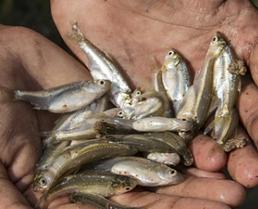
Mola is a nutrient-rich small fish that provides essential nutrients, in particular, vitamin A, calcium, iron and zinc. Including mola as part of the diet can help those suffering from malnutrition and micronutrient deficiencies. Due to raised awareness of its benefits for nutrition and health, mola has become a high-priced fish in urban markets. To address these issues, GBK promotes mola Fish culture by providing training and brood stock to selected farmers besides Carp cultivation. As the popularity of mola is continuing to spread through the rural communities of GBK working areas, farmers are able to produce the nutrient-rich mola fish and also generate much-needed income.
10.2-Carp-Golda prawn polyculture and Vegetable culture:
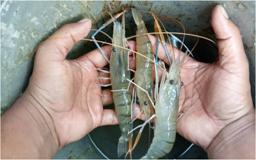
Fisheries sector of GBK supported to introduce Golda prawn nursery with carp species cultivation. In the market, Golda prawn price is high and demand is also high among consumers. So, a pond owner got profit more than other cultivation. Already GBK has been set up 20 demonstrations in the area.
10.3-Native Shing-Magur and Carp polyculture:The programme provide supported to 25 farmers for install demonstration on Shing magur and carp polyculture in the areas to influence people to adopt this technology considering these issues,
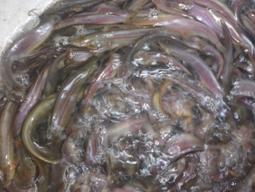
a) There are more demand of shing and magur in the market and that’s why more profit can be obtained by their culture.
b) Method of culture is easy. They can be cultured in any types of water body even in water reservoir and cage.
c) They can survive in adverse environment such as less oxygen, high temperature of water, even in polluted water.
d) They can be marketed as live condition as they can survive in less water and even in without water.
10.4-Cuchia Fattening/Culture:In our country Monopterus cuchia generally known as cuche/cuchia/mud Eel. The
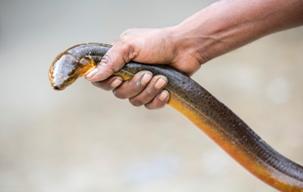
freshwater mud eel is a tasteful, nutritionally rich and medicinally valuable fish with high export demands which can play a unique role for socio-economic welfare of the area. Mud eel found in plenty commonly in stagnant waters in mud-holes in shallow beels and boro-paddy fields with low oxygen content throughout the country of Bangladesh. The population of the freshwater eel are declining at an alarming rate from the natural water bodies due to several reasons specially for overfishing, climate change, drought, made upland sluice gate, flood control barrier making, water body convert into agricultural land, frequently use of pesticide and insecticide. Now the government of Bangladesh and different NGOs implement Cuchia related different projects to conserve and existing available in nature by culture. Project working areas are considered under more suitable for culture freshwater eel specially parbatipur upazila under Dinajpur district.
The main objectives of the technology are to create employment of poor people by the way of opportunity/scope in natural breeding and establishment of household base Kuchia farming in the selected areas.
10.5-Carp Fattening:Carp fattening is a profitable adaptive livelihoods option in Dinajpur as it is both low in cost and
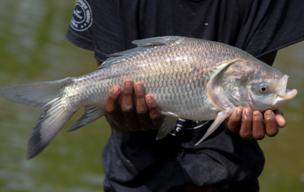
easily manageable. The fattened carp is sold at a very high price and is 2-3 times more profitable than others. GBK tried to introduce 15 demonstrations to showed result of Carp fattening and now it’s become more familiar among Fish farmers.
10.6-Nursery Pond Management: Nursery ponds are very important for producing fish seeds/fingerlings and this
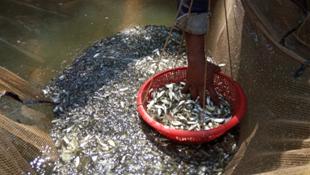
technology plays a key role as a source good quality fish seed among marginal farmers. Beside, within short time, a pond owner got more profit through this technologies and GBK made a cluster of Fish seed business in the selected area.
10.7-Low cost Fish Feed formulation and Entrepreneur development: Fish feed is the most important concern in
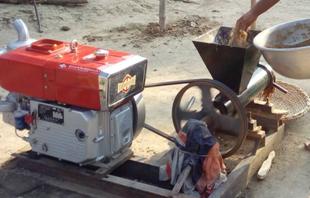
commercial fish farming. With the growing demand for fish, the use of aquaculture feed in Bangladesh has grown substantially. It seems that commercial pelleted feeds are beginning to replace “Home-made” and raw unformulated feed. At present there are at least 25 commercial fish feed mills in Bangladesh but feed price is higher so GBK introduced a Feed formulation Machine with the consider about what is the best for the fish is not necessarily what the fish eat most readily. As a result, Fish Farmers getting easily good balance of protein, fat, carbohydrate, minerals, and vitamins to ensure the feed efficiency.
10.8-Veitnam Koi Monoculture:Mono culture is a profitable income generating activities for the poor people in our
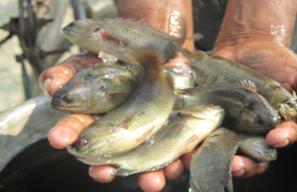
country as well as our working area. Our working areas are more suitable for fish culture, especially Vietnam’s koi species for mono culture to get more profit and good return within very short time. Mono culture is an effective way to maximize benefit from available natural food in a pond. Pond management becomes easier than polyculture. In last fiscal year 20 Vietnam koi cultue ponds has been demonstrated in the project area.
10.8-Skill development/Training/ Farm days: Training refers to the teaching and learning activities carried on for the
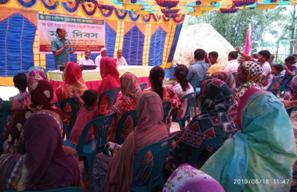
primary purpose of helping members of an organization acquire and apply the knowledge, skills, abilities, and attitudes needed by a particular job and organization. The wing conducted training and the training has specific goals of improving one's capability, capacity, productivity and performance. In the fiscal year "2018-2019" GBK has implemented different fisheries related training under Fisheries sector such as capacity building and entrepreneur development training on mixed culture, Mono culture and cuchia culture and fattening. Among of them 7 batches (175) beneficiaries received non residential two days long capacity building training where as 2 batches (50) participants were female.Field days program is arranged in the program working area as a regular basis to present the technological result in front of Fish farmers and tried to influence to implement these technology in their pond. By this way, all kind of updated information disseminates among farmers.
10.9-Exposure Visit: The Unit has been organize exposure visit at different location. At first select fish farmers whose are
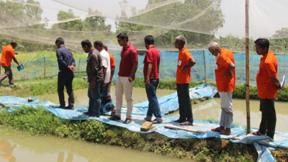
showing more interest to implement new technology in our working areas in respective branch to visit where fisheries activities run well and updated technology used.
To explore the possibility of replicating various sustainable IGAs in our working area.
To improve community management system using the lessons learned by visit successful farmer pond.
To increase skill and capacity for pond management by exposure visit to produce more production and earn more income.
- Focus on new technology, new IGAs, new culture system and management to implement by using visit learning.
Conclusion:
Poverty alleviation through sustainable development programmes for the poor and ultra-poor with appropriate financial services is the main motto of Gram Bikash Kendra (GBK). In view of this, GBK provides a large amount of financial support to the program participants for fisheries related farming activities. Sustainable farming, increased income and poverty alleviation through fish production depend on proper implementation of the related activities. Fisheries and Livestock Unit take several initiatives to develop fisheries sector through increasing productivity with sustainable fisheries technologies.
Join the world’s biggest family
Subscribe
STAY INFORMED. Subscribe to our newsletter.



